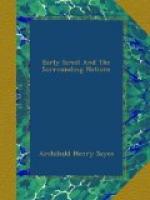With his religion there were associated ideas and beliefs some of which have a strangely Christian ring. He was a believer in the resurrection of the body; hence the care that was taken from the time of the Third dynasty onwards to preserve it by embalmment, and to place above the heart the scarab beetle, the symbol of evolution, which by its magical powers would cause it to beat again. Hence, too, the long texts from the Ritual of the Dead which enabled the deceased to pass in safety through the perils that encompassed the entrance to the next world, as well as the endeavour to place the corpse where it should not be found and injured.
The Egyptian believed also in a Messiah. Thus, in a papyrus of the time of Thothmes III., we read that “a king will come from the south, Ameni the truth-declaring by name.... He will assume the crown of Upper Egypt, and will lift up the red crown of Lower Egypt.... The people of the age of the Son of Man will rejoice, and establish his name for all eternity. They will be far from evil, and the wicked will humble their mouths for fear of him. The Asiatics will fall before his blows, and the Libyans before his flame.”
Even the conception of a son who is born of a virgin and a god is met with in the temples of Hatshepsu at Der el-Bahari, and of Amenophis III. at Luxor. Here Amon-Ra is said to have “gone to” the queen, “that he might be a father through her. He made her behold him in his divine form, so that she might bear a child at the sight of his divine beauty. His charms penetrated her flesh, filling it with the odours of Punt.” And the god is finally made to declare to her: “Amen-hotep shall be the name of the son that is in thy womb. He shall grow up according to the words that proceed out of thy mouth. He shall exercise sovereignty and righteousness in this land unto its very end. My soul is in him, and he shall wear the twofold crown of royalty, ruling the two lands like the sun for ever.”
Religious dogmas did not weaken the firm hold the Egyptian had upon morality. His moral code was very high. Even faith in Horus the “Redeemer” did not suffice by itself to ensure an entrance for the dead man into the fields of Alu, the Egyptian Paradise. His deeds were weighed in the balance, and if they were found wanting, he was condemned to the fiery pains of hell. Each man, after death, was called upon to make the “Negative Confession,” to prove that he had not sinned against his fellows, that he had not oppressed or taken bribes, had not judged wrongfully, had not injured a slave or overtasked the poor man, had not murdered or stolen, lied or committed adultery, had not given short weight or robbed the gods and the dead, had made none to “hunger” or “weep.” Only when all the questions of the awful judges in the underworld had been answered satisfactorily was he allowed to pass into the presence of Osiris and to cultivate the fields of Alu with his own hands.




